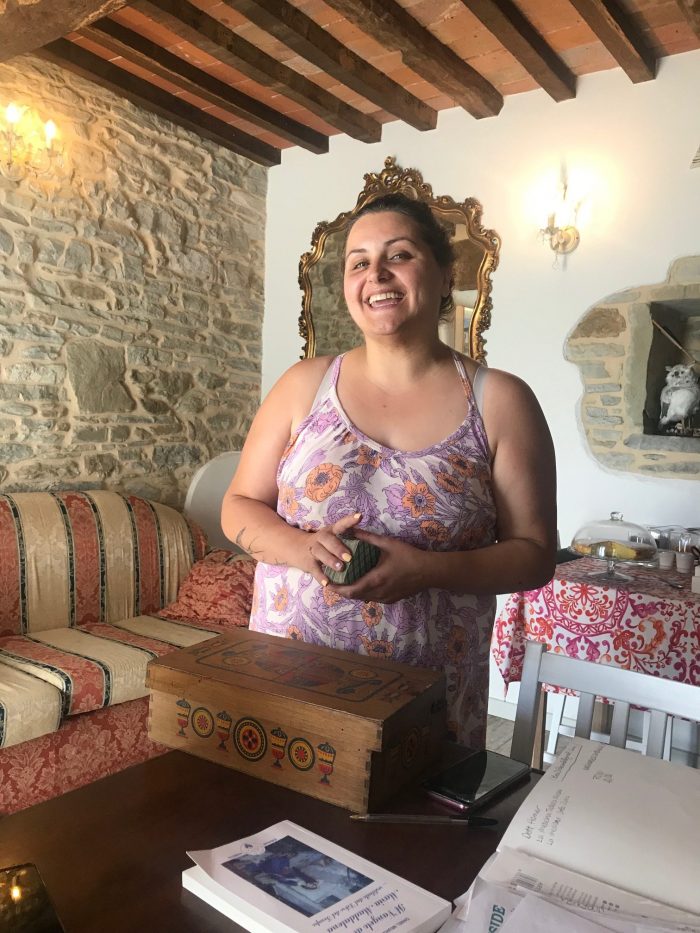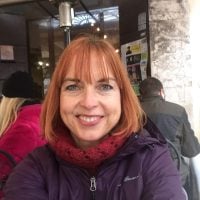*Editor’s Note: This piece is part of a series—lucky you. Head to the author’s profile to continue reading.
~
“How do you know where you’re going if you don’t know where you’ve come from?”
Leonora asked me the question, shifting her gaze from the array of tarot cards on the table to look me directly in the eyes.
“It makes a difference,” she said with quiet intensity, “to know if you’re a seed from a poppy or a seed from an oak tree—it matters.”
I sat there, taking in her words. Does it really matter? While my mind was readying to play devil’s advocate, some other part of me unexpectedly resonated with her message.
I had felt inspired to receive a tarot reading from Leonora after a delightful connection with her a few weeks prior while staying at her B&B in Tuscany. In addition to being a warm hostess and excellent baker of Italian “torta,” she had kept me on the edge of my seat as she told tales of her Sicilian “nonni” (grandparents) who had gone from peasant farmers to construction tycoons after their migration to Tunisia in the 1930s.
During the conversation, I’d noticed an oblong antique wooden box on a bookshelf, and asked if it was a family heirloom. Indulging my curiosity, she had taken the box from the shelf and opened the half-hinged lid to reveal several well-worn decks of tarot cards inside. She said she’d started learning the tarot at age seven from a great-aunt in Paris with whom she stayed every summer. She said she had a natural gift and a passion for the tarot, but rarely did readings for people.
Two weeks later, when the work contract I’d been hoping to secure in Italy fell through, I felt the urge to contact Leonora to request a reading. I’d never actually consulted a tarot reader before but I was feeling pretty desperate and wanted some direction about my future.
And yet her cards had a different agenda: they brought up my past. To my surprise, they revealed a story of adoption, of betrayal, of a biological mother who had been very young and the possible existence of brothers. Again, Leonora had me on the edge of my seat.
I’ve known that I’m adopted since I was a child. In fact I don’t remember not knowing it. Or not knowing that my mom had desperately wanted kids. So, she happily accepted the invitation by the social worker to “come look at some baby twins,” even though she and my dad had never talked about adopting more than one. They came to see my sister and I, aged 11 months, and knew there was no turning back.
I had long ago abandoned my teenage desire to seek information regarding my biological parents. Until Croatia happened.
It was 15 years ago, and I was traveling in the Balkans with my then-husband. As we walked around Zagreb, he kept pointing at women, teasingly announcing, “Hey, there’s your cousin!” And I found it an interesting experience to look around and see so many likenesses: the same pale complexion, round face, blue eyes. It was a new experience to blend in after so many years of standing out while living in Italy and other Mediterranean countries.
My sister and I were given very little information about our background—only a couple paragraphs written by the social worker:
Mother: age 18.
Father: age 21.
Ancestry: Serbo-Croatian, Scottish, Norwegian. (In 1969, “Serbo” and “Croatian” could still go together.)
She had requested that we be raised Catholic.
So when I found myself living and traveling in the Balkans, my curiosity about my background was reignited. I wondered what generation American my mother was. Did her family migrate from the former Yugoslavia? I had fun speculating: I imagined she might be more “Croatian” than Serbian since my sister and I are not blessed with those gorgeous chiseled cheekbones possessed by so many Serbian women. Plus there was the Catholic preference. Then again, maybe it was my biological father who was of Serbo-Croatian decent?
But my thoughts always wandered more toward my biological mother. Is that typical for adopted children?
While I’ve never really been possessed by this fantasy of finding a long-lost mother, I have always been interested in knowing more information. I find others’ family history so fascinating, and I wonder if it’s because mine is an empty landscape.
I’d told my sister back in high school that I wanted to find more information, and while she was less than enthusiastic, she agreed with me to go talk to our biology teacher who had just gone through the process of finding his biological mother. He indicated that tracking her down would be an arduous process since we were born prior to 1971; apparently subsequent California laws had made information access easier. In the end, my sister vetoed the idea as she was afraid of rocking the boat at home; both of us worried about hurting our mom’s feelings. So I let go of the idea.
Until my Balkan sojourn. Curiosity flared again, and again I let it go. I told myself that it didn’t really matter, what’s done is done. How did I know I wouldn’t disrupt others’ lives if I embarked on a quest to find my biological mother? Maybe she’d buried the past and wanted it to remain buried? And whatever action I took would impact my sister as well. So why dig up a past, an irrelevant history?
Or is it irrelevant?
At age 16, when living in Greece as an exchange student, it dawned on me that perhaps we Americans are much more cavalier about the idea of adoption than most other cultures.
When I told my Greek host family that I was adopted, they looked at me as if I’d just announced that feta cheese had been banned. I was perplexed by the seriousness that befell them and by what I perceived as looks of pity. Later experiences of living in Egypt, Turkey, and Italy seemed to confirm that I was in the minority about how I viewed being adopted: that it wasn’t so important. Blood didn’t matter. What counts is who raises you, not who conceives you.
Yet as I sat in front of Leonora, her words, “It matters,” played over and over in my head.
I suddenly recalled a conversation I had with my Arabic teacher in Cairo years ago. She had told me that in Islam, adoption is viewed differently—not as casually as in the United States. She informed me that it is unacceptable to pass off adopted children as “blood.” While Islam highly encouraged the adoption of orphans, it would be contrary to “truth” to cancel the biological parents from the equation, or to blur the lines. For this reason, it wasn’t customary for adopted children to assume the name of the adopted father.
“America is a new and young country, so Americans can’t understand the significance of blood ties or roots like Europeans or Egyptians,” she told me.
With the emergence of our youth-centric, highly mobile, and throw-away culture, have Americans made roots and ancestors obsolete? Or was it simply my own myopic view? I know that I grew up not quite fathoming the significance of kin or bloodlines. In fact, during a trip to Bali, it was with perplexed fascination that I watched the locals leave daily offerings for their ancestors on their home shrines.
Could it really be that we are still intrinsically connected to our ancestors?
As I pondered this all, Leonora picked up the cards spread on the table and threw out another round. “It appears you are facing a bureaucratic problem. For this you have to return to California.” I confirmed her words and sighed deeply.
“The universe is calling you back to California for a reason,” she said with the air of an oracle. “You have to go back because you have unfinished business; there’s a knot to unravel. And when this knot inside of you gets unraveled, you will be free to move forward. For now, you must find out what kind of seed you are.”
While my mind was again making its objections, again some part of me felt resonance with her words. Could her words be true? Did I have something to learn from embarking on a quest to know my origins? Will it matter to my future to learn what kind of seed I am?
It’s been over two weeks since my visit to Leonora. And I’m back in California now and wondering: To search or not to search, that is my question. Will I let my life be guided by a tarot reader?









Read 37 comments and reply